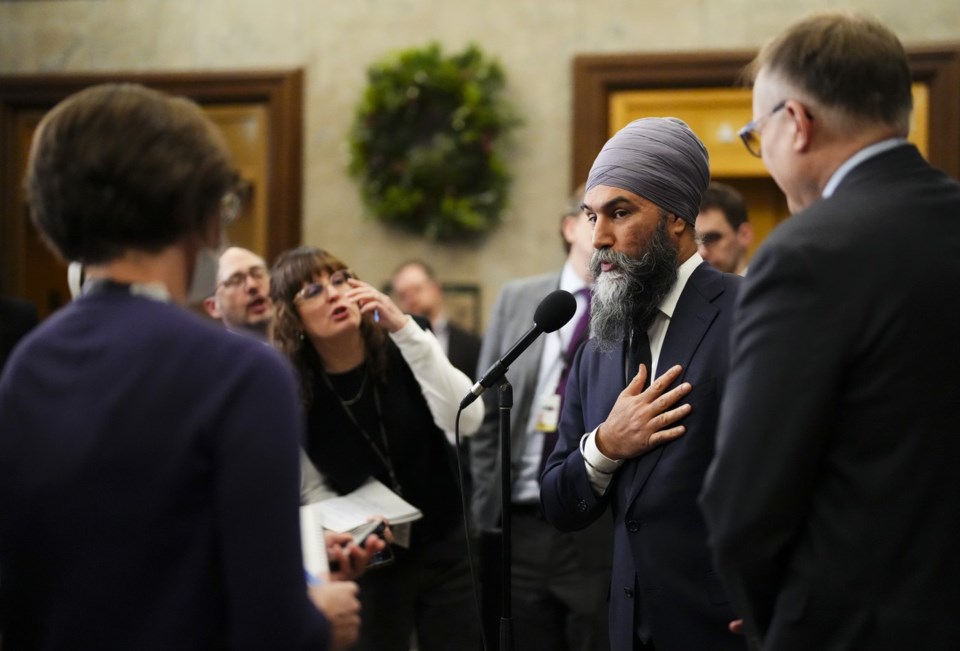OTTAWA — The Liberal government introduced a stand-alone bill to implement its proposed GST holiday Wednesday, hours after the NDP threatened it would not pass the legislation if it was linked to a $250 rebate for working Canadians.
The bill would give people a two-month GST exemption on items like premade food at grocery stores, children's clothes, toys, some alcoholic beverages and other holiday season staples.
The Liberals announced the tax break last week at the same time as they pledged to send $250 benefit cheques for people who earned a working income up to $150,000 last year.
Speaking on background, a finance ministry official said that legislation on the GST moved first because of a "real time crunch" compared to the rebate. The GST holiday is expected to begin Dec. 14 and last until mid-February, while the benefit payments are not expected until early spring.
"People are desperate for relief, and the NDP has won a little help for them," NDP Leader Jagmeet Singh said in a statement on Wednesday evening.
He added that his party would go further.
"This is not enough — the NDP will permanently take the tax off daily essentials and monthly bills if we win the election, including bills like internet, cellphone and home heating."
The NDP plan was forecast to cost about $5 billion permanently. The Liberal's temporary tax break is to cost about $1.6 billion this year.
MPs began debating the bill Wednesday night and are expected to vote on it Thursday.
While the NDP initially said it would support the whole plan, Singh said Wednesday his party would only support legislation to implement the GST break. He said the benefit plan needs to be fixed to include fully retired seniors and people who rely on disability benefits.
The Bloc Québécois is also calling on the government to expand the benefit payments to more seniors.
The Liberals need support from at least one opposition party to pass the bill to implement the GST break, which is now expected to come to a vote on Thursday.
The NDP introduced a motion to pause the ongoing privilege debate in order to get the bill introduced, debated and passed with extended sitting days Wednesday and Thursday.
The House has been mired in a debate since late September, due to an ongoing filibuster by the Opposition Conservatives.
The Tories are demanding the government turn over unredacted documents to the RCMP about misspending at a green technology fund.
The Conservatives insist that debate will continue until the documents are given to the RCMP or the NDP join them and the Bloc Québécois to vote non-confidence in the minority government.
Prime Minister Justin Trudeau said last week that both the GST holiday and the $250 cheques are aimed at helping people struggling with the cost of living.
The benefit payments would be issued to an estimated 18.7 million Canadians in the spring at a cost of around $4.7 billion.
The government has been resistant to calls to expand who gets that money, but some Liberal MPs said earlier on Wednesday that they were open to the idea.
Thunder Bay-Rainy River MP Marcus Powlowski said if the government can afford to include seniors in the payments, it absolutely should.
"If you're a senior and living on $15,000 to $20,000 a year and you don't get the $250, and someone making $150,000 gets the $250, yeah I'd be ticked off. I understand that, and it's a matter of if we can afford that, absolutely," he said after the weekly caucus meeting.
Milton MP Adam van Koeverden said about one million working seniors would receive the money, but more could be done.
"I would love to see more ambition to support seniors who need a little bit of extra help," he said.
"I also think that the conversation that we had today was great and more conversations on affordability are really, really necessary because look, our economy is doing well and that's not a sentiment that's broadly felt."
Conservative Leader Pierre Poilievre called the GST measure a "tiny, two-month tax trick" in question period and said if Trudeau cared about affordability he'd get rid of the carbon tax.
The sales tax break will include provincial sales taxes in the four Atlantic provinces and Ontario, which harmonized their sales taxes with the federal government. It means the tax break in Atlantic sa国际传媒 will be15 per cent and in Ontario 13 per cent, while in other provinces it will be less unless those governments choose to match it.
New Brunswick and Prince Edward Island have asked for compensation from Ottawa to cover their lost revenues from that, while Newfoundland and Labrador has not. Nova Scotia was in the midst of an election when the GST measure was floated, which concluded Tuesday.
Ontario said Wednesday it will match the GST break and not seek compensation, however many items on the federal list were already exempted in Ontario, including children's clothes. Ford said it will cost his province $1 billion to match all the exemptions.
This report by The Canadian Press was first published Nov. 27, 2024.
David Baxter, The Canadian Press



